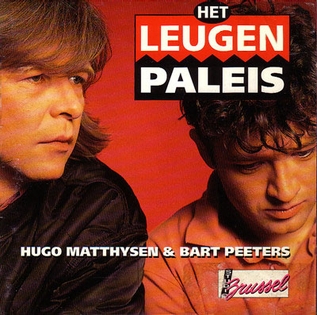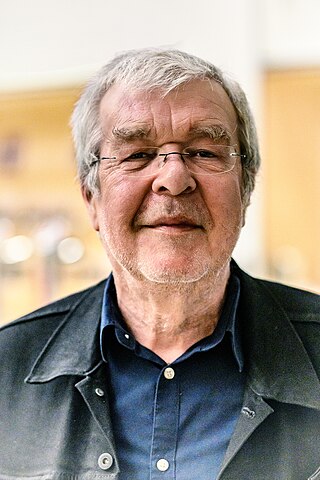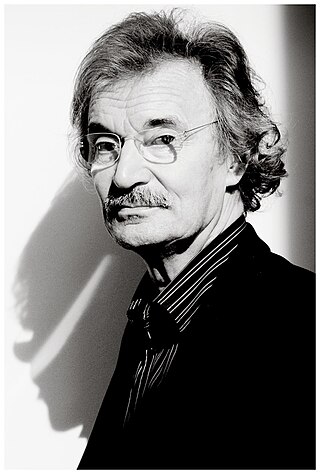Concept
Mark Uytterhoeven already enjoyed high popularity with TV audiences thanks to his humoristic presentation during the FIFA World Cup coverage in 1990 and 1994 and programs like Het Huis van Wantrouwen (1991-1992) and Morgen Maandag (1993), which all achieved high ratings. [3] The programs were notable for his use of sketches and playful use of pre-recorded video footage. Alles Kan Beter had a similar set-up, but aimed at a smaller audience. [4] The show presented footage taped from the TV channels VRT and VTM, usually from news reports, but talk shows or advertisements weren't uncommon either. The footage often focused on lapsus, language errors, verbal tics, new media trends, odd mono- and dialogues or unintentionally funny moments. Uytterhoeven provided ironic commentary to this footage and sometimes he and his co-host, tried to surpass it, either in the studio itself or in pre-recorded sketch films. Their studio sketches often spoofed the verbal style of the footage they had shown before, complete with word play, while the sketch films were more visual parodies.
The production was very intense. Uytterhoeven had three video recorders running at home to make sure he wouldn't miss any suitable material. Many lines were scripted beforehand, but there was also room for improvisation since Uytterhoeven didn't want to rehearse anything, nor inform his co-hosts beforehand of what they were about to see or do. He only left them with vague instructions, which they could prepare at home. Each episode was recorded Thursday evening, one day before the actual broadcast.
Impact
Alles Kan Beter was a cult show from the start. Guy Mortier, who was mostly a famous face to readers of his own magazine Humo and people who'd listened to the 1980s radio show De Taalstrijd became more well known with the general public. [5] Rob Vanoudenhoven had only appeared on television before in some sketches of the game show De Drie Wijzen and was thus a complete nobody to most viewers. He addressed this by introducing himself in the pilot episode as I'm the man of whom half Flanders now wonders: "Who the fuck is Vanoudenhoven?". He gained such popularity with audiences [6] that he received his own TV show a year later, De XII Werken van Vanoudenhoven (1998-1999), which managed to become a colossal ratings hit. By the time the second season of Alles Kan Beter aired Vanoudenhoven was a huge media star, which irked Uytterhoeven somewhat since it destroyed his original intention of introducing an unknown face in the show. Some of the guest hosts also gained more fame with TV audiences by appearing in the program.
Alles Kan Beter won Humo's Prijs van de Kijker (1999), the Prijs van de Radio- en Televisiekritiek for Best TV Show (1999) and the HA! van Humo (1999). [7] After two seasons Uytterhoeven felt they had done enough with the concept. The production process had been so intense that he specifically stated no third season would ever be made. Yet there have been some one-off specials in the decades beyond, including during Humo's Pop Poll Night in 1999 and the 50th anniversary of the Flemish public channel in 2002. In the fall of 2001 Uytterhoeven and Vanoudenhoven also hosted the humoristic talk show Alles Komt Terug, which also combined amusing archive footage with parody sketches. Between 2003 and 2005, when Uytterhoeven was host of De Laatste Show, he also had a weekly segment with Guy Mortier called Gefressenes Funden, where they gave ironic commentary to footage recorded on TV earlier that week.
Alles Kan Beter has never received an official DVD release, since so much of the footage parodied in the show was taken from rival TV channel VTM, which would lead to copyright issues. In the fall of 2008 a one-off DVD was released as a gift with the magazine Humo , compiling the best and most popular moments. Many episodes can also be watched on YouTube, albeit illegally. And they are still rebroadcast regularly on both Canvas and also on its sister channel één.

Humo is a popular Dutch-language Belgian weekly radio and television magazine.

VTM or Vlaamse Televisie Maatschappij is the main commercial television station in Flanders and forms part of a network of channels owned by DPG Media.
VTM 2 is a Belgian television channel owned by the commercial broadcasting company DPG Media.
Woestijnvis is an independent Flemish television production company based in Vilvoorde.

Mark Uytterhoeven is a Belgian television presenter, TV scriptwriter, actor, comedian and former sports journalist.
Wouter Vandenhaute is a Belgian Entrepreneur, Television producer and former sports-journalist. He is currently managing director of the Belgian media holding De Vijver, which includes the TV production company Woestijnvis and TV channel VIER. Vandenhaute married VRT sports journalist Catherine Van Eylen.

Het Leugenpaleis was a Flemish (Belgian) radio sketch comedy show by Hugo Matthysen and Bart Peeters, presented from 1988 until 1999 on radio station Studio Brussel. At the time it enjoyed a huge cult following.
Radio2 is a Belgian radio channel operated by the Flemish public broadcaster Vlaamse Radio- en Televisieomroep (VRT).

Schalkse Ruiters, translated as "Roguish Horsemen", was a Flemish humoristic TV talk and game show, broadcast on the TV channel Eén between late 1996 and early 1998. The program was a cross between a comedy show, a talk show, a game show and a mockumentary. Hosted by Bart De Pauw and Tom Lenaerts viewers were shown three video reports about three different topics. The people in the studio and viewers at home had to vote whether they believed each individual video to be real or staged. In between these reports hidden camera segments and comedy sketches were shown.
The Voice van Vlaanderen is a Belgian reality talent show. The 1st season of the Flemish version premiered on November 25, 2011 on the vtm television network.

Bart De Pauw is a Flemish TV host, comedian, actor and TV and film scriptwriter, known for humorous television series and shows on Belgian public television, like the satirical sketch show Buiten De Zone, the humorous talk show Schalkse Ruiters, Het Geslacht De Pauw, the sketch show Willy's en Marjetten, the game show De Mol and the humorous series Quiz Me Quick and De Biker Boys. He is also the scriptwriter of the Belgian blockbuster film Loft (2008), the original Flemish version of the Hollywood remake The Loft (2014).

Hugo Matthysen is a Belgian (Flemish) singer, guitarist, columnist, writer, Master in Philosophy and actor. He lives in the municipality of Hove in Antwerp.
Studio Kafka was a Flemish sketch comedy radio show presented on the radio station Studio Brussel between 1995 and 1999. It was presented by Belgian cartoonists Kamagurka and Herr Seele and aired each Sunday afternoon between 13.00 and 14.00 p.m.
Wij, Heren van Zichem was a Flemish TV drama series, originally broadcast between 1969 and 1972 in 26 episodes on the BRT. The program was based on several novels by Ernest Claes, who died just a few months before the show first aired. All episodes were shot in the Flemish village Zichem. At the time it was one of the most popular TV series in Flanders, attracting almost 2,960,000 viewers which is about 3/4 of all Flemish people. Tourism to the village boomed, while it hardly had enough bars, let alone restaurants to accommodate the tourists. In a 2004 interview with Het Nieuwsblad actor Fons Exelmans remembered that tourists were often confused because certain houses and buildings were located less close to each other than in the series. The actors were also invited to appear during annual festivities as promotional stunts.

Buiten De Zone was a 1994-1996 Flemish humoristic-satirical TV series aimed at a teenage demographic. It was a combination of a sitcom and a sketch show and was broadcast on the Flemish public TV channel TV1. It gained a cult status and has been rerun several times since. The show was furthermore important for launching the notability of TV host Bart De Pauw, who both co-wrote and acted in the series.

Guy Mortier is a Flemish journalist and radio and television personality. He is known as former chief editor of magazine HUMO for over thirty years (1969–2003). Apart from editing articles, he also wrote pun-based headlines for them and occasionally wrote columns and reviews of rock records.
The Masked Singer is a Belgian reality singing competition television series based on the Masked Singer franchise which originated from the South Korean version of the show King of Mask Singer. It premiered on VTM on 18 September 2020. The first two series were hosted by Niels Destadsbader. The winner of the first series was Sandra Kim. The winner of the second series was Camille Dhont. The third and fourth series are hosted by Jens Dendoncker. Aaron Blommaert won the third series.
The Ha! van Humo is a yearly award offered since 1980 by the Flemish magazine Humo to the best television show of the year. The winner, chosen from 10 nominees, receives 5,000 Euro and a sculpted "H". In the first years, the show has also been given a few times to a TV maker and to a radio show instead of a television show. In 1997 and 2014 there were 2 winners, in 2012 no award was presented.

Man bijt hond is a long-running Flemish TV programme. The show aired in Flanders and the Netherlands, with separate versions for each country. The Flemish version aired from 1997 to 2013, whilst the Netherlands version originally aired from 1999 to 2015, with a revival airing since 2019.

Tom Yvo Adrien Waes is a Belgian television presenter, television director, actor, model, and occasional singer. Internationally he is most known for his role in the Netflix series Undercover. In addition, Waes is an ambassador for the non-profit organization Sea Shepherd.











